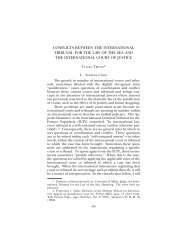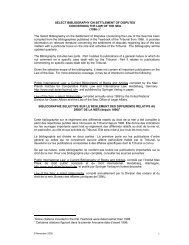John H. Jackson, Fragmentation or Unification Among International ...
John H. Jackson, Fragmentation or Unification Among International ...
John H. Jackson, Fragmentation or Unification Among International ...
You also want an ePaper? Increase the reach of your titles
YUMPU automatically turns print PDFs into web optimized ePapers that Google loves.
828 INTERNATIONAL LAW AND POLITICS [Vol. 31:823I think it was fair to say that the United States was pushinghard f<strong>or</strong> a rule <strong>or</strong>iented system and f<strong>or</strong> improvement of thedispute settlement process. The Europeans opposed that andtried to prevent any change to the settlement process beyondthat which had occurred in the evolution I described. Duringthe 1980s, however, the Europeans changed 180 degrees. Bythe end of that decade they came to embrace the need f<strong>or</strong> astronger dispute process with implementation of what mightbe called “sanctions” in appropriate cases. There are variousreasons f<strong>or</strong> this shift, but arguably among them was the socalledU.S. “unilateralism.” The Europeans felt that the institutionsneeded some s<strong>or</strong>t of check on U.S. unilateralism. Hasthat succeeded? So far, f<strong>or</strong> the first three and one-half years, ithas succeeded. The question remains: will it continue to succeed?It is interesting to note the difference between this andsome other dispute institutions, particularly the <strong>International</strong>Court of Justice (ICJ). The ICJ has little m<strong>or</strong>e than 100 caseson its docket, compared to the GATT/WTO which has approximately400 cases in this period. Since the creation of theWTO at the beginning of 1995, over 140 cases have beenbrought. A number of those have been settled independentlyin a process that appears very rule <strong>or</strong>iented, so that in fact therules are succeeding in leading to m<strong>or</strong>e settlements. Aboutfifteen cases have gone all the way through the process,through the appeal. The addition of an appeal is one of thestriking elements of this new procedure.Let me turn to some other questions that have beenraised. My third point looks at the question of how internationallaw interacts with the WTO system. Is this a hermeticallysealed regime? Clearly, the answer is no! And the answer hasalways been no, in my opinion. Some scholarly writings havesuggested the contrary, but I think those were wrong. And Ithink they have quite adequately been proven wrong. Eventhe late GATT jurisprudence referred to the Vienna Conventionon the Law of Treaties and to customary internationallaw. Late panel rep<strong>or</strong>ts also referred to international law principles.Even the WTO’s first case, the Gasoline Case, explicitlyreferred to international law—including, in particular, Article






